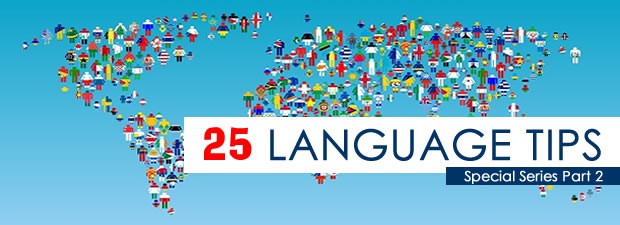Expansion, Interpreter Costs, & Speaking

Whether you are new to or very familiar with Auerbach International, to celebrate our 25th year in business we are pleased to present an e-newsletter series of 25 Language Tips. This will also include examples of some of our most interesting projects.
3 – Factor in Language Expansion
The most common European languages require more words than English to express the same concept. For French, Spanish and Portuguese, it is about 20% more. For Dutch, German and Russian, it is about 10% more.
Professional layout artists can often adjust the size of the letters or reduce the margins to make a translation fit if a layout must remain, say, eight pages. But when you have a brochure or manual with very full text with small margins – and if you cannot expand your page count – where are these extra words to go?
Please consider this language expansion ratio when preparing your English versions … or design them with ample blank space to allow for additional words.
The same principle applies to localizing commercials, CDs or movies that usually must remain within say 30 seconds, 4 minutes or 2 hours. If the narrator is speaking quickly, where does your professional language agency put all those additional dubbed or subtitled words?
In either case, one solution is to cut the English text by 10 or 20% so that the abridged translations will expand into the allotted time. Another solution is to use shorter words such as “need” instead of “requirement” whenever possible. But here too, if your corporate writers or filmmakers considered global versions at the outset, their localized productions would be less complicated and less costly to implement.
4 – Interpreters: Why Costs Should Not Count
In the language business, translators are like doctors and interpreters are like surgeons; professional linguists usually start out with the same training but then branch off to specialize either in written or spoken communication.
While translators (of written documents) can take time to research a specific term or speak with colleagues to clarify a meaning, interpreters (of spoken conversations) do not have that luxury. They literally must think on their feet in meetings, in court or at conferences and render the target language very quickly and often spontaneously.
As with everything else, interpreters come in all qualities. Those with the most experience and specialized expertise such as for diplomatic negotiations about agricultural import tariffs command higher rates.
Just as you would not entrust your BMW to a Volkswagen repair shop, why would you want to risk your business meeting, court case or conference to an under-qualified interpreter with limited knowledge of your industry terminology? In essence, what is it worth to you to avoid mistakes and ensure accuracy? That should be the main criterion by which you evaluate interpreting rates. Is the lowest priced person worth the risk?
5 – You Can Speak Any Time in Any Language
A lot of business and communication is lost because you cannot speak the language of your prospective customer, patient or foreign-born employee. But by using a 24/7 telephonic interpreting service, you can.
Through this medium, you receive a toll-free number, a PIN code and a menu of say 150 languages and dialects. You simply press the language code and within seconds you are connected to a telephonic interpreter.
If you are ringing a limited-English speaker, you simply put the call in conference mode and hold a three-way conversation. If the limited English speaker is in the same room, you can simply put the call on speakerphone. In this way, you can gain the sale or communicate your concerns and demonstrate that the limited-English speaker is important to you.
PROUD PROJECT
At 5pm on a Friday summer night, we got a call from a political consultant in New York who was advising the opposition Prime Ministerial candidate for the following month’s general election in Italy. He desperately needed to put his PowerPoint presentation and position paper into Italian for a phone meeting with counterparts in Rome at 8am the next morning. He asked if we could do it.
Out of curiosity, I asked why he came to us instead of to local language agencies in New York. “Because,” he replied, “it’s 8pm here and all agencies are closed. You have a great reputation and I figured you in California might still be open.” –which we were.
Knowing that this would be one of many miracle deliveries we have performed over the years, I said that we could do it. “In the meantime,” I advised, “go enjoy the remaining daylight in Central Park and then go for dinner. Come back to your office around 11pm your time, and we’ll have it done for you.”
So where would we find a team of Italian translators who could do a rush job within three hours on a Friday night? In one place where it was still daytime: Hawaii. Just as we were three hours earlier than our new client in New York, we knew that our team in Honolulu was three hours earlier than we were in California. So we arranged for our translation-editing-proofing team to postpone their afternoon surfing and produce this job for our New York client. Which they did. They delivered to us, we delivered to him and everyone was happy. Except for our client-consultant’s political candidate. He lost his election after all.
As one of the most experienced language agencies in the world, we thank you for the opportunity to serve your company’s ethnic or global expansion needs…though we do not suggest waiting until the last minute to submit your projects!
If You Missed Tips #1-2: See Pricing and Interpretation Timing
